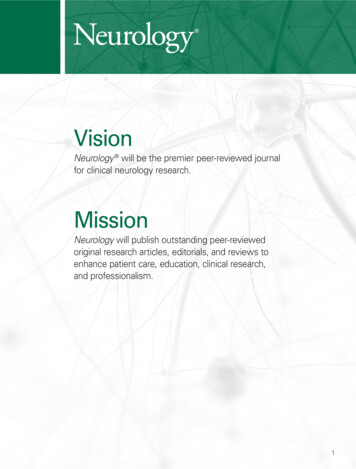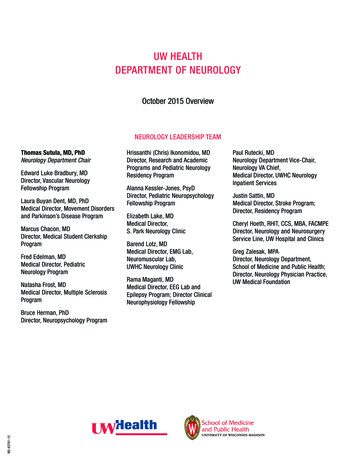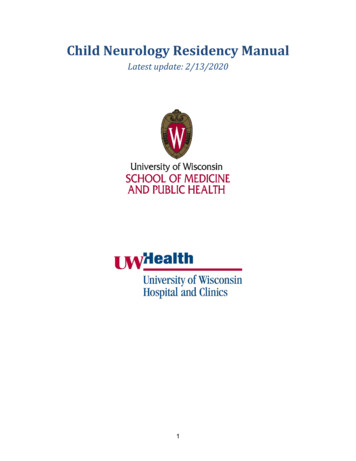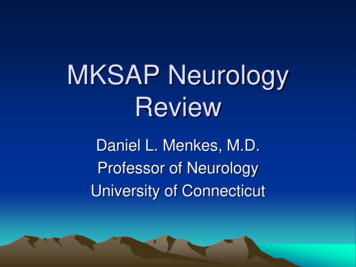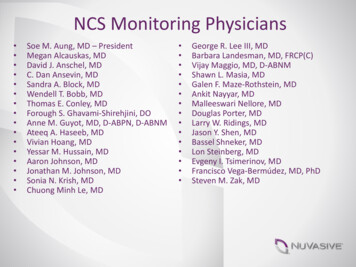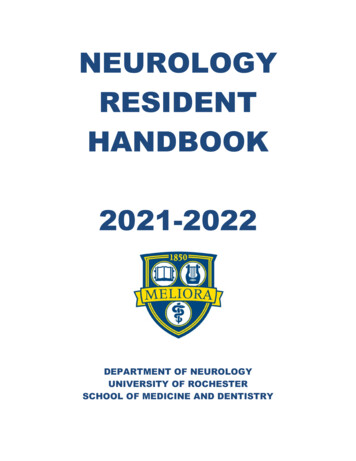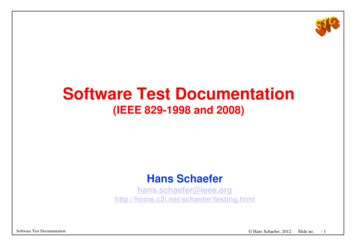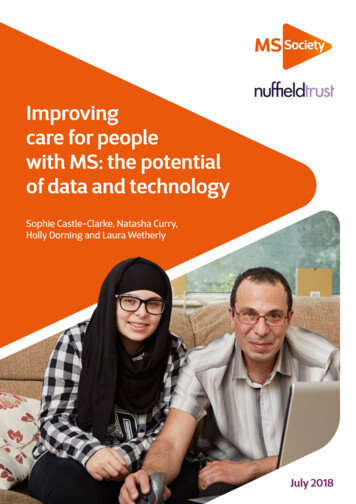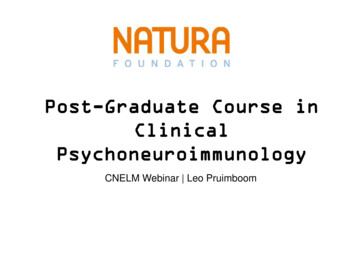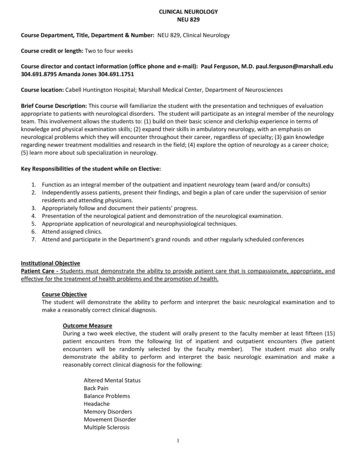
Transcription
CLINICAL NEUROLOGYNEU 829Course Department, Title, Department & Number: NEU 829, Clinical NeurologyCourse credit or length: Two to four weeksCourse director and contact information (office phone and e-mail): Paul Ferguson, M.D. paul.ferguson@marshall.edu304.691.8795 Amanda Jones 304.691.1751Course location: Cabell Huntington Hospital; Marshall Medical Center, Department of NeurosciencesBrief Course Description: This course will familiarize the student with the presentation and techniques of evaluationappropriate to patients with neurological disorders. The student will participate as an integral member of the neurologyteam. This involvement allows the students to: (1) build on their basic science and clerkship experience in terms ofknowledge and physical examination skills; (2) expand their skills in ambulatory neurology, with an emphasis onneurological problems which they will encounter throughout their career, regardless of specialty; (3) gain knowledgeregarding newer treatment modalities and research in the field; (4) explore the option of neurology as a career choice;(5) learn more about sub specialization in neurology.Key Responsibilities of the student while on Elective:1. Function as an integral member of the outpatient and inpatient neurology team (ward and/or consults)2. Independently assess patients, present their findings, and begin a plan of care under the supervision of seniorresidents and attending physicians.3. Appropriately follow and document their patients' progress.4. Presentation of the neurological patient and demonstration of the neurological examination.5. Appropriate application of neurological and neurophysiological techniques.6. Attend assigned clinics.7. Attend and participate in the Department's grand rounds and other regularly scheduled conferencesInstitutional ObjectivePatient Care - Students must demonstrate the ability to provide patient care that is compassionate, appropriate, andeffective for the treatment of health problems and the promotion of health.Course ObjectiveThe student will demonstrate the ability to perform and interpret the basic neurological examination and tomake a reasonably correct clinical diagnosis.Outcome MeasureDuring a two week elective, the student will orally present to the faculty member at least fifteen (15)patient encounters from the following list of inpatient and outpatient encounters (five patientencounters will be randomly selected by the faculty member). The student must also orallydemonstrate the ability to perform and interpret the basic neurologic examination and make areasonably correct clinical diagnosis for the following:Altered Mental StatusBack PainBalance ProblemsHeadacheMemory DisordersMovement DisorderMultiple Sclerosis1
NeuropathySeizureStrokeWeaknessFor a four week elective, the student shall present thirty (30) patient encounter presentations utilizingthe same criterion as noted above and below.Course ObjectiveThe student will know principles of laboratory and neuroimaging workup to aid in differentiation of diagnosticproblems.Outcome MeasureThe student will include in the oral presentation to a faculty member from the above, the principles oflaboratory and neuroimaging workup to aid in differentiation of diagnostic problems.Course ObjectiveThe student will know principles of treatment, management and rehabilitation of patients with neurologicdiseases and deficits.Outcome MeasureThe student will orally discuss with a faculty member, the principles of treatment, management andrehabilitation of patients with neurologic diseases and deficits.Institutional ObjectiveMedical Knowledge- Students must demonstrate knowledge of established and evolving biomedical, clinical,epidemiological and social-behavioral sciences, as well as the application of this knowledge to patient care.Basic Science ObjectiveThe student shall be able to demonstrate the ability to apply evolving biomedical, clinical, epidemiological andsocial-behavioral sciences to neurological patient care.Outcome MeasureThe student shall present to the faculty a topic such as “Treatment of Brain Tumors” or “MRI Imagining in MS”during the two week rotation. For a four week rotation, the student shall make two presentations to the faculty.The presentation topic(s) is (are) to be pre-approved by the course director.Course ObjectiveStudents will have the opportunity to see patients undergoing EMG and EEG tests. They will also have theopportunity to understand the role of multiple diagnostic modalities including CT, MRI and ultrasound imagingas well as lumbar puncture and other lab investigations relevant to patients seen on the floors and in the clinics.Outcome MeasureStudents shall see at least two EMG’s and two EEG’s and shall record the experiences on the patient loggersystem. Students shall also orally demonstrate to the faculty a basic understanding of the role of other multiplediagnostic modalities including CT, MRI and ultrasound imaging as well as lumbar puncture and other labinvestigations relevant to patients seen on the floors and in the clinics.Institutional ObjectiveInterpersonal and Communication Skills- Students must demonstrate interpersonal and communication skills that resultin the effective exchange of information and collaboration with patients, their families, and health professionals.2
Course ObjectiveAs part of the health care team, the student must be able to communicate information effectively.Outcome MeasureThe student will orally present to a faculty member on a regular basis as described above. Communication skillswill be assessed at that time.Institutional ObjectiveProfessionalism- Students must demonstrate a commitment to carrying out professional responsibilities and anadherence to ethical principles.Course ObjectiveStudents must be able to provide patient care that is compassionate, appropriate, and effective for thetreatment of health problems and the promotion of health and in an ethical, responsible, reliable anddependable manner.Outcome MeasureThe student will be directly observed by faculty to determine the appropriateness of the behaviors noted above.ASSESSMENT METHODSMid-Point EvaluationTwo Week RotationsStudents will be given verbal feedback on their performance at the end of week one.Four Week RotationsThe Course Director will evaluate student performance at the end of the first two week to review the student’sprofessional, clinical and academic performance up to that point. This formative evaluation must be reviewedwith the student and the student will have an opportunity to discuss with the Course Director. The form mustbe signed by the student and returned to the Course Director. The Course Director shall then forward a copy ofthe form to the Office of Academic Affairs. The form will NOT be included in the student’s official academicrecord.Preceptor Evaluation- 100%The preceptors’ evaluation will be based upon, but are not limited to, the following factors: Attendance and participation in tutorials Conference attendance Demonstration of basic knowledge of patient care during clinic Maturity and Professionalism Oral Case presentation/patient workup Participation in call Participation in clinic Performance on Clinical Presentations Preparedness Topic Presentations3
FOR THOSE TAKING THE FOUR WEEK ROTATION a case presentation will also be required.Case PresentationThe student will be required to give a 10-15 minute case presentation at a pre-arranged time during their clinicalrotation. The presentation will be given to the course director and medical students. Students will be notified of thedate and time of their presentation one week in advance.GRADINGThe final grade for this course will be either Honors, Pass or Fail and will be based upon the factors outlinedabove.ATTENDANCEIf at any time the medical student is unable to meet their clinical responsibilities they must notify the Course Directordirectly during working hours Monday-Friday, 8:00 am - 5:00 pm. All absenteeism will be required to be made up andmay be at a rate of one days make up for every day missed.If a student misses two or more unexcused days, the student will be required to reschedule the missed days on therotation. Request for an excused absence must be submitted in writing at least one week in advance via the StudentScheduler to the course coordinator. The request will be reviewed by the course director who will either grant or denythe request. Excused absences will not be retroactively granted.Attendance at Grand Rounds is mandatory. Unexcused absences will result in one extra case presentation for eachabsence.MUJCESOM Policies: All medical students taking this course will comply with School of Medicine policies given vidual policies can be found at the following websites:Student Infectious Material e.aspMS-IV uments/policies/Yr4attendence.pdfAcademic Dishonesty -Code.pdfAcademic Standards ts/Policies/ASC-FINAL-POLICY.pdfPolicy for Students with ocuments/Guidelines.pdfUniversity Computing Services’ Acceptable Use Affirmative Action Policy:pp. 8/gr sp08.pdfInclement Weather ts/policies/MUSOM-Inclement-Weather-Policy.pdf4
Notification of delays and cancellations of classes are posted on the Medical Education Home Page when Marshall University MainCampus is not in Recommended Reading:Overview of Neurology, suggested as background reading during clerkship (choose one):Lange’s Clinical Neurology; Ed. Aminoff MJ, Greenberg DA, Simon RP. 6th ed.Blueprints in Neurology (Blueprints Series), by Frank Drislane et al.Brief review of neurology as part of USMLE review series.Weiner and Levitt’s Neurology (Neurology for the House Officer); Rae-Grant, A.Comprehensive textbooks of Neurology, useful for reference purposes:Harrison’s Neurology in Clinical Medicine; Ed. Hauser S.Merritt's Textbook of Neurology. Rowland, L.P. 11th ed.Adams and Victor’s Principles of Neurology. Ropper AH, Brown R. Eighth Ed.Neurology in Clinical Practice. Bradley, Daroff, Fenichel, Jankovic. 5th Ed.5
Weiner and Levitt’s Neurology (Neurology for the House Officer); Rae-Grant, A. Comprehensive textbooks of Neurology, useful for reference purposes: Harrison’s Neurology in Clinical Medicine; Ed. Hauser S. Merritt's Textbook of Neurology. Rowland, L.P. 11th ed. Adams and Victor’s Principles of
